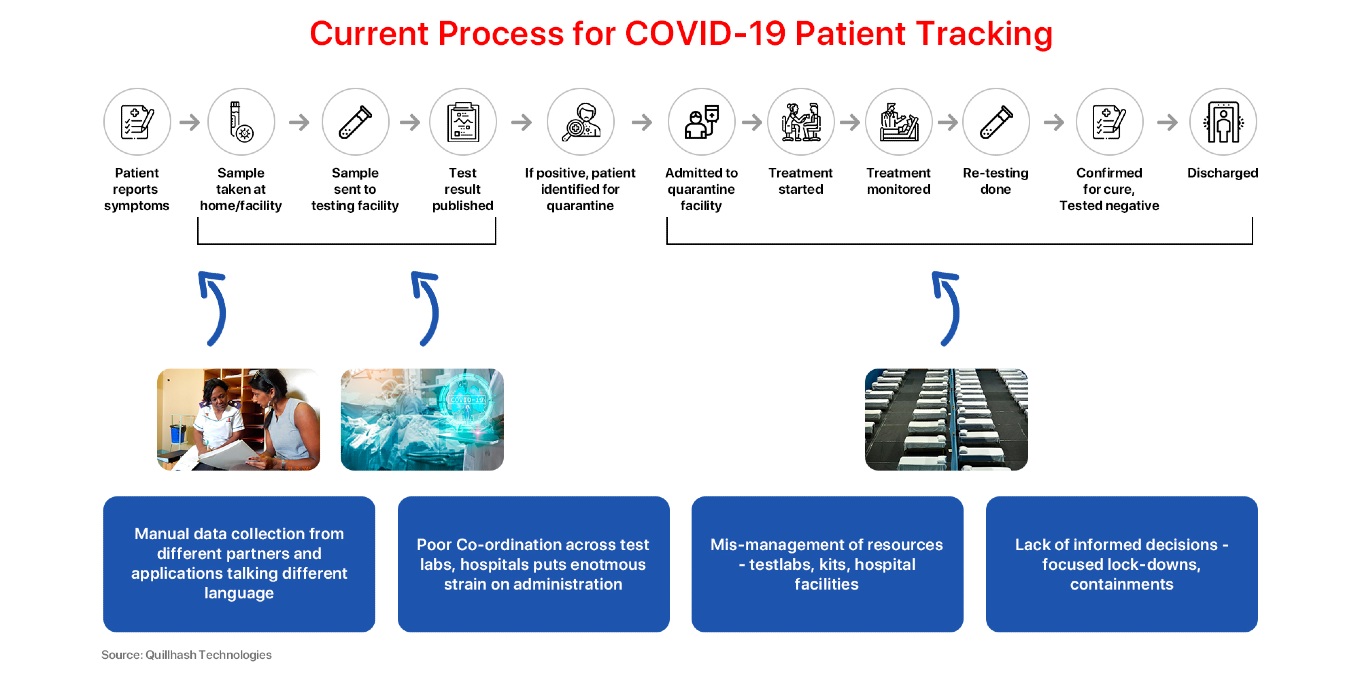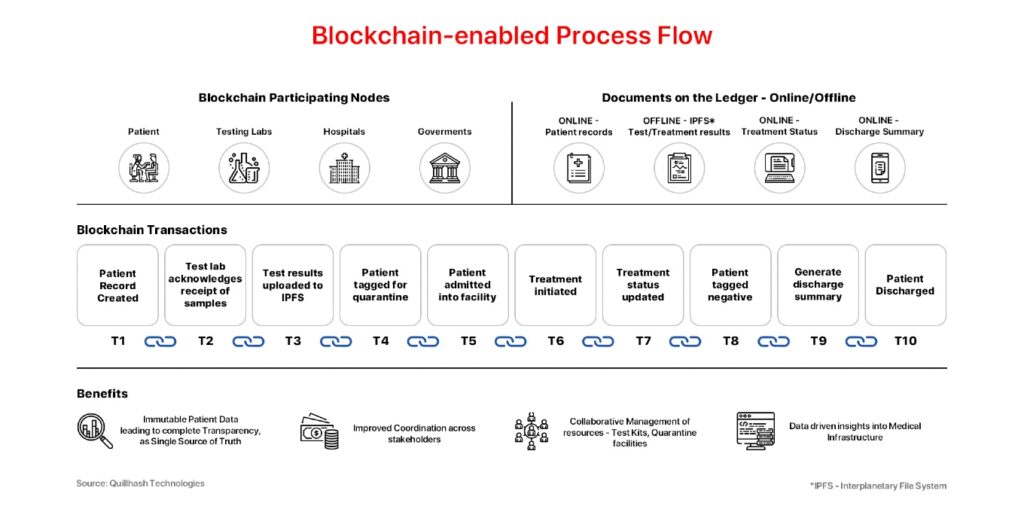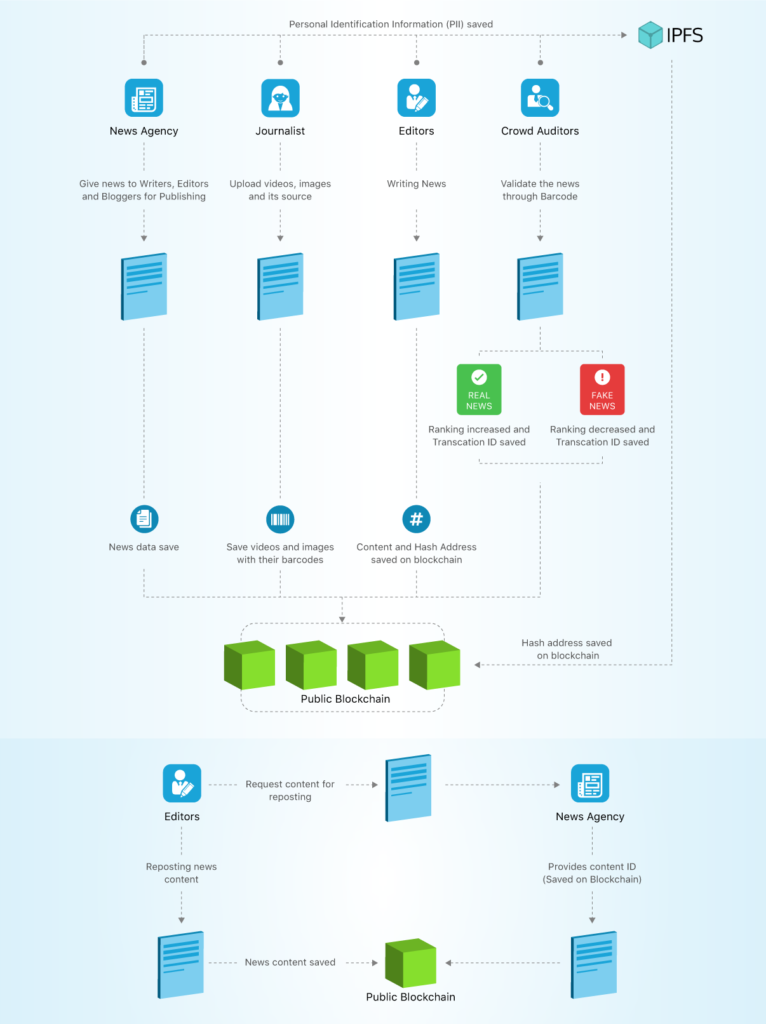Blockchain applications rule out any need for government surveillance for tracking patients
Decentralised technology is also being used for busting fake news pertaining to Covid-19
India’s Quillhash has launched QuillTrace for patient tracing
Covid19 Tech Impact
Latest updates & innovations, in-depth resources, live webinars and guides to help businesses navigate through the impact of the COVID19 pandemic on India's economy.
US filmmaker and Heisenberg Capital founding partner Max Keiser once said, “If Bitcoin had come 10 years earlier, 9/11 would never have happened!”
This was merely speculation about undoing something which had already caused a lot of damage. While Bitcoin arrived on the scene in 2008, today, eighteen years after that fateful September 11 in 2001, humans are once again facing a massive crisis. And this time it could very well define the future of the human race.
As one of the worst pandemics in history grips the world in fear, can blockchain — the much-lauded foundation of Bitcoin — save the day now?
The truth is that Covid-19 can’t be merely solved by medicine or technology — it needs human behaviour to change. Man is a social animal but to survive this period every person needs cut off due to precautionary and preventive measures. And blockchain can be immensely helpful in the fight as agreed by some of the largest international organisations such as the United Nations and the World Economic Forum.
This could also be understood by the fact that despite significant damage done, China has successfully managed to control Covid-19 pandemic to a larger extent. And, among various key technologies implemented to fight the pandemic was blockchain.
Yes, even the UN in its official newsletter recently applauded Ant Duo-Chain, a blockchain-powered supply chain finance platform for helping SMEs deal with financial constraints during the Covid-19 pandemic. Chinese investment major Ant Financial which also owns AliPay has launched a blockchain-powered online information platform for epidemic prevention materials in Zhejiang province, ensuring the supply chain and usage of materials such as face masks and protective clothing are more transparent.
One of the biggest issues in fighting the Covid-19 pandemic has been that people are hesitant to come out for testing due to privacy issues and social stigma of being labelled as a suspect case. Speaking to Inc42, Vaideeswaran Sethuraman, founder and CEO of blockchain startup Param Network, said that with the help of blockchain, testing centres could publish data pseudo-anonymously and track the positive cases. This would help the government quickly act on policies to quarantine and lockdown the affected neighbourhoods
“Today a lot of small communities are acting in silo within cities like Bangalore but they can create a much bigger impact if they can collaborate and act. Blockchain can be a decentralised platform to build something like city-level funds creation, managing everything transparently.”
Tracking Patients Without Violating Privacy
The World Health Organisation (WHO) in its ‘Global surveillance for COVID-19 caused by human infection with COVID-19 virus’ document has asked the member countries to track and publish the Covid-19 patients’ history of travel to or residence in a location reporting community transmission of Covid-19 in the 14 days prior to symptom onset.
There are of course the conventional ways to publish the information online. In fact, various states such as Karnataka have been publishing the information online, without giving due attention to patients’ privacy.

This is where blockchain comes to the rescue. Speaking to Inc42, Preetam Rao, cofounder and CEO of Quillhash Technologies said that this is the best use-case forblockchain in fighting Covid-19 “how we can keep patient data privacy and share with others, and how we can track and trace a patient on blockchain”
Gurugram-based Quillhash Technologies has in fact developed a Blockchain-based architecture called QuillTrace Covid-19 to solve this. According to Preetam, the proposed architecture will store only key data related to the patient, while storing private data (medical records, the standard of care) either offline, in encrypted form or not stored at all if not needed.

Based on the Ethereum blockchain protocol, all data on the blockchain layer is ‘hashed, thus offers data protection. Preetam has already published a white paper in this regard according to which, the architecture will provide simple APIs to –
- Patients via decentralized apps or existing mobile apps (COWIN-20 / COVA )
- Testing labs for reporting status on the IPFS (Interplanetary File systems) for offline Test result storage. IPFS is also a blockchain-based file sharing protocol used for offline record storage. It offers the same level of data protection/ scalability.
- Hospitals for reporting patient status via simple APIs posting transactions as they happen.
- Government authorities to listen to the other ‘nodes’ and generate data-driven insights real-time
- APIs for third-party developers and companies
On the implementation part, Rao informed that they are currently in talks with various governments and are participating in the hackathons.
Another Kochi-based blockchain startup Accubits technologies has further proposed a health card-based access system as part of its RebuildTheChain project. The system uses blockchain technology to enable governments to facilitate contact tracing without violating the user’s data privacy.
In a statement shared with Inc42, cofounder Aharsh M S informed that the system abides by the General Data Protection Regulation (GDPR) laws which ensure that each individual has full control over their own personal data. All PII (Personally Identifiable Information) data and data pertaining to location, and routing are pseudonymized and stored on a blockchain network, complying with the official data protection laws. In the platform, the actual data remains with the user while only a hashed form of it is stored on a blockchain network. The health authorities can access the pseudonymized information from the Blockchain network for the analytics and projections related to the pandemic.
With the ability to enable facilitate a health-card based access system for the citizens the system helps enforce a partial lockdown of the economy rather than a complete lockdown that can tremble the economy. The health-card is also powered by blockchain technology to satisfy the privacy concerns of citizens.
No Need For Government Surveillance
Besides India’s QuillTrace and Accubits technologies, San Francisco-based HACERA, in partnership with IBM, has launched MiPasa, a blockchain-based platform to synthesise data sources, address their inconsistencies, help identify errors or misreporting and seamlessly integrate credible new feeds.
According to Jonathan Levi, CEO, HACERA, “What MiPasa provides is attested data using three types of validations between disparate data sources: reconciliation of disparate data sources like the WHO figures, the CDC figures and others; ensuring new data entered into the system matches the original, and a third level of validation comes from the public, who could report inconsistencies or bad data and give public health officials a seamless way to analyze and respond to public sentiment.”
MiPasa project is an open platform for attested coronavirus data built on Hyperledger Fabric and draws data from WHO, and the Center of Disease Control, the Israeli Public Health Ministry and any qualified agencies.
At a time when the Indian government has launched Aarogya Setu App which clearly states that “Your data will be shared only with the government of India, the app does not allow your name and number to be disclosed with public large,” using crowd data and validating the same, MiPasa not only bats for privacy but the project also makes a point that there is no need for even government surveillance.
Atlanta-based Acoer is another blockchain startup which has released HashLog data visualization engine for coronavirus tracking. Based on Hedera hashgraph, the tracker takes public data made available through different sources such as CDC, WHO and Google Trends and displays in aggregate and allows for simple and visual filtering, dynamic changes based on values selected and ability to download selected data.

Storing Covid-19 Testing Data Anonymously
US-based startups blockchain entities Telos foundation and Genobank known for its DNA Saliva kit to keep track of all the data sets and genomic reports without exposing their personal data have joined hands to launch an open-source app Agernoa for Covid-19 testing data.
The app will allow users to securely source low-cost Covid-19 testing. The results will be stored anonymously on the Telos blockchain, where each user will control their own data and have the ability to share their results with researchers, if they choose, using health privacy and a new token from Genobank.io, according to Telos Foundation’s announcement.
To be launched this month, Agerona mobile app users will be able to find a source for the test kits in their country and order separately from the app without revealing their identity. The users can then use barcode instead of their personal identity and send it to a verified lab for processing. While the test results will appear on Agerona’s blockchain, there will not be any information that would track the individual, disclosing his/her personal identity.
The solution is being introduced after numerous people across the world, including do not want to get tested as it reveals their personal identity and thereby their legal statuses.
Genobank.io CEO Daniel Uribe said, “Along with Telos, we aim to contribute by sharing our experience in the fields of genomics, privacy laws and decentralized DNA data wallets to achieve the best privacy-preserving platform and an anonymous COVID-19 Test kit using the Telos Network. People have the right to know if they have the coronavirus without violating their privacy.”
According to the official blog, Agernoa will also have an experimental feature where users can record a sound clip of their cough, if they choose, and submit it for the creation of an AI-based diagnostic tool. This tool, built on Genobank.io technology, will attempt to provide a way for people to perform an instant pre-test for the virus simply from the sound of their coughing.
Busting Fake News On Covid-19
While Indian startups such as vPhrase and MetaFact have deployed AI to combat misinformation, thanks to its traceability, transparency and decentralised architecture, blockchain has been tested platform for combating misinformation. Right from Google’s PoC to The New York Times’ The News Provenance Project in association with IBM, numerous projects have been announced and under implementatión for busting fake news.
Bengaluru-based Truthshare claims to have a breakthrough invention to solve the misinformation problem across social media platforms using a cryptographic and new identity model. The startup is currently engaged with the ministry of information and technology, Indian government for the same. Speaking to Inc42, Abilash Soundarajan, founder and CEO, Truthshare said, “We have filed multiple patents and the core patent has already been granted. We are currently reaching out to Social media platforms, regulators and all other stakeholders.”
Italy, despite having one of the best health infrastructures in the world, has been one of the most impacted countries in the world. It has so far lost over 17.7K people nationwide and so far has over 140K confirmed cases.

In such a scenario, Italian News Agency ANSA in partnership with Ernst and Young has launched a blockchain solution called ANSAcheck to combat misinformation on Covid-19. The solution is based on EY OpsChain Traceability technology, characterised by public transactions recorded on the Ethereum blockchain.
With ANSAcheck tracking label, readers can trace the history and source of each news item. According to ANSA, the foundation of the platform is the smart contract, which is an IT object that allows the creation of a cryptographic string of the news and allows verification of the information published by the news agency. When the readers display the news on their browser, they can verify the presence or absence of the digital sticker, because the sticker will be assigned by verifying the parameters of the news published on the ANSA website. When these parameters match with the ones recorded in the blockchain during the creation of the news, the published news will receive the ANSAcheck digital sticker that tracks the news’ origin.
Crowdsourcing The Other Demands
While Canada-based blockchain startup VitalHub has come up with an electronic screening tool for long-term care, Param’s Sethuraman points out that blockchain could also be the best fit solution in crowdsourcing various demands during lockdown which is more or less a new reality now.
The world is getting more decentralised. Already many companies have reported that VPN is not able to support 100% workforce working remotely, as the central system is becoming a bottleneck, said Sethuraman. Thus, blockchain can play a role in exchanging data securely in a decentralised fashion with full accountability and traceability. It also makes the data machine-readable for intelligent automation.
Sethuraman is currently working on an application for crowd-sourcing the food demands for the migrant workers and managing supply. “We are also building a fully decentralised ecommerce app on the Param chain which not only gives the traceability of the goods being delivered, it also keeps track of list of packers and delivery boys associated with the customer delivery for future correlation in case of any pandemic situation.”
Why India Is Not Paying Attention To Blockchain
The Indian government, despite having recognised blockchain technology as one of the most crucial futuristic technologies in its whitepapers, has hardly made any progress on the implementation side. The NITI Aayog’s grand blockchain project IndiaChain, announced a couple of years back is yet to hit the ground.
Similarly, in the case of Covid-19 pandemic, the government has not shown any interest in adopting blockchain-based solutions. Rajesh Nair, founder and CEO of blockchain startup Happystry which introduced the world’s first loyalty tokens on blockchain explains the rationale.
There are millions of crypto traders, but the fact of the matter is that India does not have an adequate number of blockchain developers. Furthermore, timing is crucial in fighting this pandemic. Developing PoC and make it production-ready is not only time consuming but would require funding as well, said Nair.









![[The Outline By Inc42 Plus] Do Tech Workers Want Offices To Reopen?](https://inc42.com/cdn-cgi/image/quality=75/https://asset.inc42.com/2021/05/Outline_65_Feature1360X1020-490x367.jpg)

![[The Outline By Inc42 Plus] What is Holding Back India’s Healthtech?](https://inc42.com/cdn-cgi/image/quality=75/https://asset.inc42.com/2021/05/Outline_64_FeatureImage_Final-03-490x367.jpg)





















 Ad-lite browsing experience
Ad-lite browsing experience